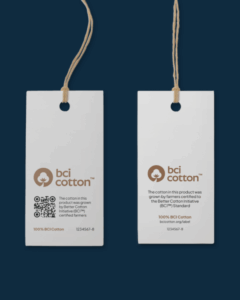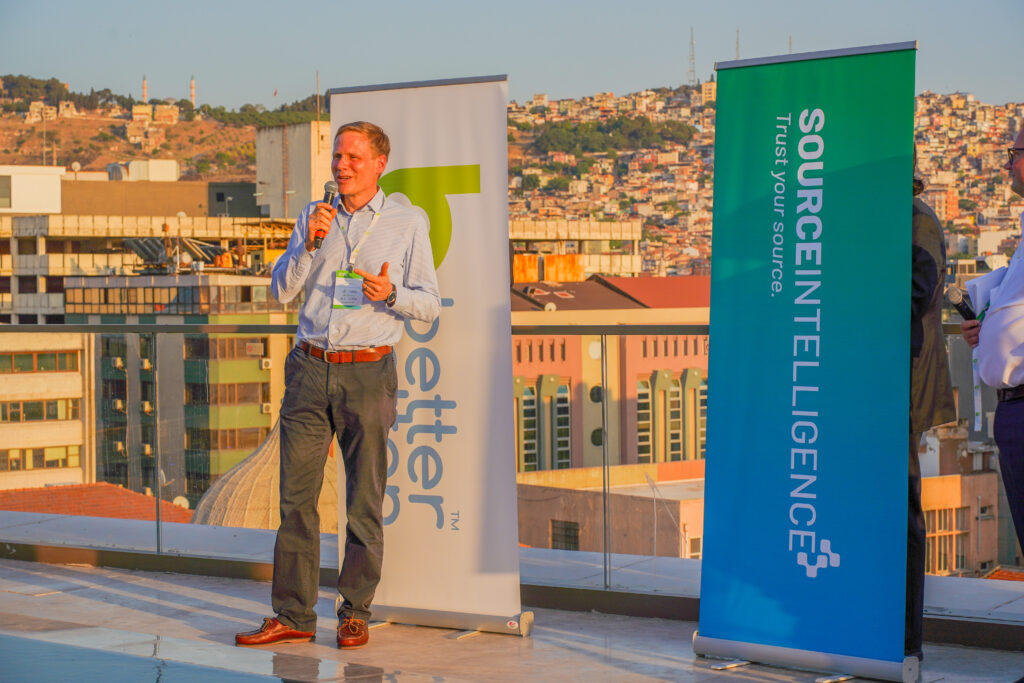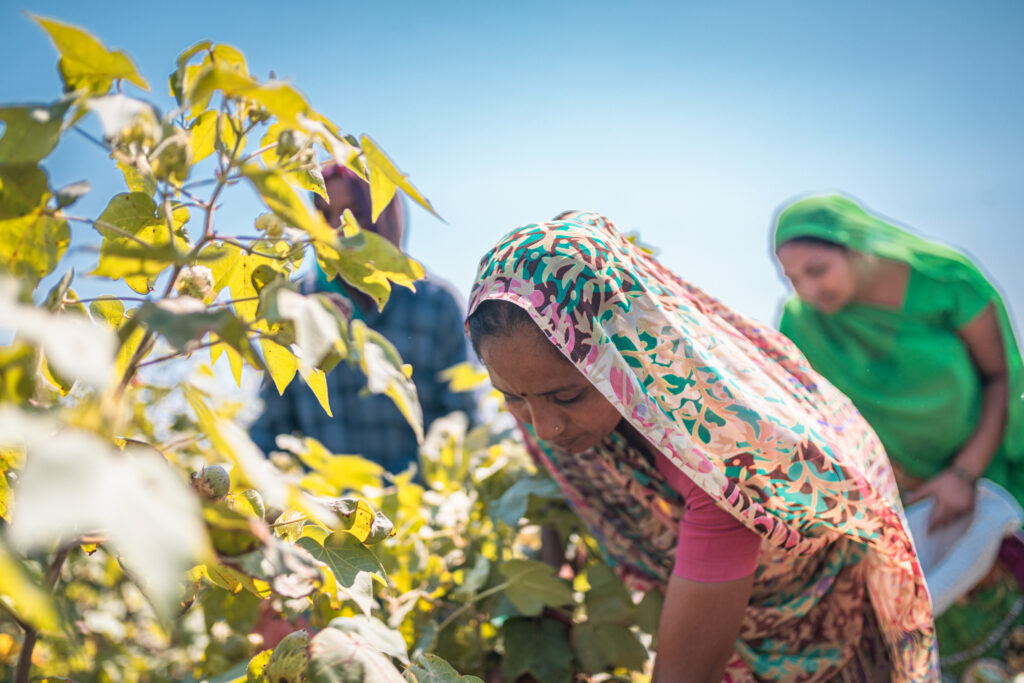Breaking barriers, building futures: recognising women cotton farmers
Recent studies by BCI reveal the scale of women’s contributions to cotton – and the hurdles they face in moving from invisible labourers to equal decision-makers.
Read moreRecent studies by BCI reveal the scale of women’s contributions to cotton – and the hurdles they face in moving from invisible labourers to equal decision-makers.
Read more

By Rogerio Simoes, Media & Content Manager at the Better Cotton Initiative
The Better Cotton Initiative (BCI) marked this year’s World Cotton Day with significant changes: it launched an innovative product label; it updated its logo, website, and overall design; and adopted its original name, having been known simply as Better Cotton in the past few years.
These changes may seem unrelated, but they are part of the same picture. They are connected to several steps taken recently by BCI to improve transparency, accountability, and its overall connection with members, partners, farmers, consumers, and the general public.
From the new label that now informs the presence of Physical BCI Cotton contained in a product to a name that emphasises the organisation’s role as an initiative, all that is the result of years of efforts to expand and deepen the organisation’s impact.


Our new product label comes out of the traceability system that has been gradually implemented since November 2023. In the past two years, we at the Better Cotton Initiative have been expanding our capacity to trade Physical BCI Cotton, traced back to its country of origin – offering brands, retailers and consumers the assurance of a commodity, BCI Cotton, produced by farmers certified to our standard.
Now, the BCI Cotton label will offer brands and retailers the ability to share with their consumers that story, on their own products. If a product sourced by a certified BCI Retailer or Brand Member contains at least 30% of Physical BCI Cotton, and the remaining up to 70% contain only other materials, that retailer or brand will now be able to share that information with consumers.
The new label, which is optional, provides the following:
Our CEO, Nick Weatherill, clearly summarised the meaning of our new product label. “In a time of increasing scrutiny around sustainability claims, global trade pressures, and shifting Environmental, Social, and Governance (ESG) priorities, transparency and accountability are more critical than ever.”
“As we celebrate World Cotton Day, our new label reaffirms our commitment to both, as part of our mission to drive measurable impact and continuous improvement in sustainability across the cotton sector.”
The BCI Cotton label comes in a year marked by another milestone. In June, during BCI’s annual conference in İzmir, Türkiye, we announced that the Better Cotton Initiative’s standard will close remaining gaps, so it is fully aligned with the fundamental principles of regenerative agriculture. While several principles of regenerative agriculture have already been followed by BCI alongside our certified farmers for years, a few elements remain to be fully implemented – and that is what the Better Cotton Initiative is now doing, with completion expected by June 2026.
None of these new steps, however, would be possible without something even more important: our impact throughout 16 years of operations, in more than 20 countries, improving conditions for over 2 million farmers. Much of this story can be found in the Better Cotton Initiative’s 2024-25 Annual Report, which goes beyond the achievements of the past year to provide a broader report of our impact over the years. You can download the report from this page.
With new label new logo, and new impact numbers that we proudly share with our community, embracing our original full name was an easy decision to make. By becoming once again the Better Cotton Initiative, we remind our farmers, members, and partners that BCI is and has always been an initiative, a forward movement committed to constantly improve sustainability in cotton farming.
Not only are we an initiative, but we are taking it too, by creating new ways of communicating with both our community and consumers – on top of the bold actions we have taken. Years ago, even though our mass balance system allowed us to achieve the scale required to support hundreds of thousands of farmers every year, we took the initiative to develop, introduce, and expand our own traceability system.
We also took the initiative to become a certification system in February of this year. The certification process, conducted by independent third parties, was another important step towards full accountability and transparency, aligning what brands and consumers increasingly demand from us with our responsibility to support farmers, their families, and their communities.
Whilst the changes above were still being implemented, again we took the initiative, by announcing that the BCI standard would become a regenerative one. Being an initiative was in our creation, has been part of our DNA since then, and it is now once again officially part of our name.
We hope our farmers, members, partners and colleagues appreciate and make good use of our changes, proudly announced on this year’s World Cotton Day. They can be certain that, behind new visual identify, name, and label, one thing remains the same: our determination to improve sustainability in cotton production, including delivering to consumers the information and the results they expect and deserve to see.
Press release: Better Cotton Initiative Marks World Cotton Day with Launch of Innovative Product Label
Our new BCI Cotton label page: What the BCI Cotton Label Means
Read moreEva Benavidez Clayton, Senior Director of Demand & Engagement at the Better Cotton Initiative, reflects on BCI’s increasing emphasis on regenerative agriculture.
Read moreA network of multistakeholder initiatives, including the Better Cotton Initiative, Cotton Incorporated, Cotton Australia, and the U.S. Cotton Trust Protocol, has released new guidelines on Lifecycle Assessments.
Read moreThe Better Cotton Initiative (BCI) has launched an innovative product label which allows brands to provide greater clarity about the origin and percentage of BCI Cotton in their products.
Read moreBetter Cotton has teamed up with climate technology startup Planboo to help cotton farmers reduce greenhouse gas emissions – and earn carbon credits for it.
Read moreAbdur Rehman, Better Cotton Farmer, demonstrating habitat creation for beneficial birds (birdhouses and water dishes).
Read more

By Alexander Ellebrecht, Account Executive at Source Intelligence
Source Intelligence was Sponsor at the Better Cotton Conference 2025 in İzmir, Türkiye
At Source Intelligence, we help companies strengthen supply chain visibility and compliance through two complementary platforms. C Map enables organizations to meet complex regulatory requirements by leveraging bill of materials (BOM) data across multiple tiers of their supply chain. ChainPoint serves standards and scheme holders, supporting first-mile traceability and capturing critical data that is often difficult to obtain. We are now integrating these platforms. This will deliver deeper transparency and greater value, not only for standards organizations, members, and stakeholders, but also for shareholders. Because today, transparency is not optional anymore.
Better Cotton has taken a thoughtful, step-by-step approach to building traceability using ChainPoint. They started with ginner-to-spinner traceability, then gradually extended the scope and introduced more detailed claim types. Several years ago, the system was based largely on a mass balance approach—a method that allows Better Cotton Claim Units (BCCUs) to be traded through the supply chain while maintaining an associated sustainability claim, even if the cotton is mixed with conventional sources. In recent years, the demand for visibility has grown. More companies now want to know with certainty: “Is this 100% Better Cotton that we are buying?”
This shift has led to the adoption of segregated models, which keep Better Cotton physically separate from conventional cotton throughout the chain. These models provide higher transparency and stronger claims. It’s a journey Better Cotton is still on—and one we are proud to support.
The cotton industry is aware of its impact. We hear many farmer stories, of farmers who could improve their production with training and support from Better Cotton. Topics like irrigation, regenerative agriculture, are addressed, and it’s good to discuss this with the sector at the Better Cotton conference. These discussions help retailers and companies, at the end of the supply chain, understand the problems on the ground, while also creating opportunities for more collaboration.
With the existence of social media, companies are becoming increasingly responsible and accountable for their supply chain activities. We also see some government regulations and compliance topics, so there is really a driver for transparency. Transparency will not go away. It will stay on the agenda.
One principle I particularly appreciate is controlled transparency. This means not every piece of information is available to everyone, but rather that access is purposeful and relevant. This approach fosters trust, encourages openness, and enables more efficient collaboration.
We should be proud of how far we’ve come, but we must also keep asking: What can we do better? By applying proven quality management practices, we can work more efficiently, accelerate progress, and deliver lasting improvements. We’re also seeing strong growth in the collection and management of reliable data. Automation is making documentation less of a burden and more of an opportunity—helping people focus on insight and action rather than paperwork.
The Better Cotton Conference matters because it’s ultimately about people. Progress in supply chains depends on collaboration, and while we have many digital tools—Zoom, Teams, and others—that make connecting easier, nothing replaces the depth of understanding that comes from meeting in person.
Read more

ISEAL has published version 2 of its Sustainability Claims Good Practice Guide, a critical resource for sustainability systems across industries, and Better Cotton is proud to have taken part in its consultation process. Our contributions, alongside the ones from other organisations in the sector, have helped shape this latest update, contributing to a shared commitment to strengthen the credibility and transparency of sustainability claims globally.
The guide outlines key good practices for sustainability systems in the management of claims and labels in a responsible, accurate, and trustworthy way. For people and organisations working with complex supply chains and diverse stakeholders, this document plays a vital role in ensuring that public-facing claims reflect both the substance of the work and the integrity of data.
As sustainability communication continues to evolve, tools like this guide help ensure we remain aligned with current and emerging expectations from regulators, businesses, and consumers alike.
What’s New?
Version 2 of the ISEAL guide has been updated to reflect the realities of today’s sustainability landscape. This includes consideration of recent regulatory developments, such as new laws and standards concerning green claims, as well as the increasing role of digital platforms in sustainability messaging.
With more claims being shared across websites, social media, and other online channels, the update helps sustainability systems adapt their communications to remain transparent and credible in a fast-paced digital world.
The guide also features expanded guidance on the wide range of claim types that organisations might use, such as product-related claims, organisational claims, or performance-based claims. It offers clear recommendations on how to develop, manage, and monitor these claims in a way that minimises risk and upholds public trust.
Importantly, this version is fully aligned with the ISEAL Code of Good Practice, which means it reinforces consistency and best practices across sustainability systems. This alignment ensures that claims are not only accurate but also made within a structured, standardised approach to sustainability assurance.
To make the guidance even more actionable, the update includes a new tool: the “What & Why Clauses” quick reference document. This is a checklist-style summary that breaks down the guide’s core components into digestible, practical elements, making it easier for scheme owners and their partners to apply the recommendations in real time.
Relevance for Better Cotton
This updated guidance comes at a particularly timely moment for Better Cotton, as we continue to strengthen our own Claims Framework. By ensuring that our claims align with the latest industry-wide expectations and best practices, we can provide greater clarity and confidence to all those who engage us, from retailers and brands to farmers and consumers.
Our participation in the consultation process was an important opportunity to bring our perspectives to the table and help shape a guide that serves the diverse needs of the sustainability community.
As sustainability claims face increasing scrutiny, from regulators, media, and consumers alike, the need for credible, consistent, and transparent communication has never been more important. This update to the Sustainability Claims Good Practice Guide offers a timely and practical resource to support those working to improve sustainability practices and strengthen trust across supply chains.
To explore the full guide and access supporting materials, please visit the ISEAL website.
Read moreBetter Cotton has launched a public consultation on targeted updates to its Principles & Criteria, the farm-level Standard and one of the core components of the Better Cotton Standard System.
Read more